
|
![]()
Greatest Films of the 1930s
1930 | 1931 | 1932 | 1933 | 1934 | 1935 | 1936 | 1937 | 1938 | 1939
Title Screen Film Genre(s), Title, Year, (Country), Length, Director, Description 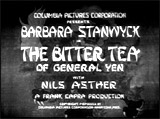


The Bitter Tea of General Yen (1933), 88 minutes, D: Frank Capra
Director Frank Capra's sophisticated, beautifully photographed film, considered non-PC, controversial and provocative at its time, was due to the inter-racial or cross-cultural romance in the plot. In the story, strong-willed missionary Megan Davis (Barbara Stanwyck) from New England traveled to Shanghai, China in the 1930s, during a war-torn time of civil unrest. After joining her childhood sweetheart and chaste fiancee Dr. Robert 'Bob' Strike (Gavin Gordon), the betrothed couple became separated as they attempted to liberate an orphanage. Megan was taken prisoner (during rescue from a street riot) by ruthless and imposing Chinese warlord General Yen (Danish actor Nils Asther), who was assisted in his country stronghold by financial consultant Jones (Walter Connolly). Megan was presumed dead. To everyone's surprise, they developed an affectionate courtship and relationship, even though he had a mistress (also traitorous) - the lovely Mah-Li (Toshia Mori). However, their forbidden romance was threatened by invading Chinese rebels, and things came to a tragic, bitter end for the general.

Bombshell (1933), 90 minutes, D: Victor Fleming
Director Victor Fleming's satirical, pre-Code farce included many inside jokes (and rapidly-paced dialogue) about Hollywood (it was a precursor to Sunset Blvd. (1950) and The Bad and the Beautiful (1952)), flappers and the hectic movie business - reportedly about star Clara Bow (director Fleming's ex-fiancee). Pampered movie sex symbol Lola Burns (Jean Harlow), the "bombshell" of the title, was thwarted by studio press agents and her demanding director - her divorced ex-lover Jim Brogan (Pat O'Brien), so she attempted to escape by changing her locale and loose-living image. She fled Hollywood for a desert hotel in Palm Springs, where she fell for wealthy Gifford Middleton (Franchot Tone), an upper-class effete snob, but left him too when her alcoholic father Pops Burns (Frank Morgan) was snubbed by his 'blue-blood' family. When she returned to the movie studio, she realized that her unscrupulous, unethical, manipulative and overbearing publicity director Space Hanlon (Lee Tracy) (who had also loved her) had set her up, hiring Middleton and others in his "family" as impersonators, in order to get her to return to the movies and to him.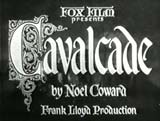

Cavalcade (1933), 110 minutes, D: Frank Lloyd
Fox's and director Frank Lloyd's over-produced film was a portent of other British costume drama award-winners in future years. This oft-forgotten Fox film, an adaptation based on Noel Coward's dramatic stage play (adapted by Reginald Berkeley), was honored with four nominations and three wins - Best Picture, Best Director, and Art Direction/Decoration. The big budget production, with epochal scenes and an anti-war attitude was a sweeping, episodic film, spanning over thirty years. It featured an all-British cast (including Clive Brooks, Diana Wynyard, and young Frank Lawton) in its tracing of the lives of the turn-of-the-century, British upper-class Marryot family, from an 1899 New Year's Eve celebration around the time of the Boer War and the death of Queen Victoria through the sinking of the Titanic, World War I, the 1920s, the Depression, and up to a second New Year's Eve celebration in 1932. The effects of good and bad times and world events on the family's lives were chronicled (i.e., wartime, the death of the Queen, the husband's knighthood, the loss of one son on the Titanic and another in the Great War).



Dinner at Eight (1933), 113 minutes, D: George Cukor
'Woman's director' George Cukor's star packed, masterfully-directed classic MGM masterpiece was a witty, poignant romantic comedy-melodrama from producer David O. Selznick. It was based on the popular, dialogue-rich Broadway hit by George S. Kaufman and Edna Ferber, and followed the successful pattern of MGM's previous year's Best Picture winner Grand Hotel (1932). It was studded with a tremendous ensemble cast of stars and filled with choice lines of dialogue. The plot revolved around various relationships between the characters before a dinner party party. A social-climbing, flighty Park Avenue snob Millicent Jordan (Billie Burke) was hosting a formal "dinner at eight" party in Manhattan during the height of the Depression, and invited an assortment of high-society guests. Vignettes and mini-episodes told the story, as cracks in the facade of the high-society members were beginning to emerge. Suicide, financial ruin, love, infidelity, economic pressures, class conflict, the dawn of the talkies, divorce, aging and fading careers, and alcoholism were all adversely affecting their interactions. From the time of the invitations to the actual party, she ignored the physical and financial struggles of her floundering businessman-husband Oliver Jordan (Lionel Barrymore). The invited guests included crass, crooked, rich tycoonish entrepreneur Dan Packard (Wallace Beery) and his candy-chewing, trampish, brassy blonde trophy wife Kitty (Jean Harlow) who often battled each other, the forgotten and aging ex-Broadway grand dame stage star Carlotta Vance (Marie Dressler), the cheating family physician Dr. Wayne Talbot (Edmund Lowe), and fading, suicidal, alcoholic silent-era matinee idol Larry Renault (John Barrymore).



Duck Soup (1933), 70 minutes, D: Leo McCarey
This anarchistic, satirical, zany, anti-war film was one of the Marx Brothers' finest. It was filled with classic diplomatic blunders, comic combat, terrific one-liners, slapstick gags, and great political humor. In the plot, wealthy millionairess Mrs. Teasdale (Margaret Dumont), who was a supporter of the financially strapped, tiny country of Freedonia, decided to appoint a new president, dictatorial Rufus T. Firefly (Groucho). War clouds threatened almost immediately when Firefly insulted neighboring Sylvania's ambassador Trentino (Louis Calhern). Chicolini (Chico) and Brownie (Harpo) were hired as incompetent spies sent to get war plans.

Flying Down to Rio (1933), 89 minutes, D: Merian C. Cooper
This pre-Code RKO musical film marked the first screen dance-partnering of Fred Astaire with Ginger Rogers. Due to the box-office success of Warner Bros.' 42nd Street (1933), many other studios revived the dance-musical with numerous productions, including this one. It cleverly and convincingly combined exotic background and travelogue footage of South America's romantic city of Rio with studio sets. The real stars of the film were not the debonair and charming Astaire (who was cast in a secondary role as assistant band-leader, accordion player, and wise-cracking sidekick Fred Ayres) and Rogers (as band vocalist Honey Hale), but Dolores Del Rio (as beautiful Brazilian Belinha de Rezende) and aviator-pilot and Yankee Clippers bandleader Gene Raymond (as playboy Roger Bond) involved in romantic entanglements en route to the Hotel Atlantico in Rio. There were two main highlights in the film: (1) "The Carioca" dance sequence when the dancing couple stepped onto a small stage to dance the routine (including bumping foreheads and hips) while surrounded by seven white pianos, and (2) the spectacular aerial finale to mark the Hotel's opening with an air show (prefaced by Astaire's only vocal number "Flying Down to Rio") in which dozens of scantily-clad chorus girls (some performing synchronized aerobatics in unison) were attached to the wings of biplanes during an exciting fly-over.

Footlight Parade (1933), 104 minutes, D. Lloyd Bacon
This was one of the three most spectacular smash-hit musicals in 1933 from Warner Bros. and legendary choreographer Busby Berkeley, alongside the two earlier films: 42nd Street (1933) and Gold Diggers of 1933 (1933). This backstage musical entry has often been considered the best of all three. The film was also notable for its suggestive and snappy pre-Hays Code dialogue and fast-paced scenes. In the plot, unemployed yet enterprising Broadway theatrical producer Chester Kent (James Cagney in his first, big singing-and-dancing musical role) was working with his loyal secretary Nan Prescott (Joan Blondell) in a familiar backstage plot. They were about to put on a lavish show that revolved around the production of live music numbers (called "prologues") for movie theatres to present before features, to give stage performers work who had been rendered unemployed by the advent of the "talkies." The thin plot was basically an excuse to show off the elaborate and extravagant Berkeley production numbers, especially the three showstoppers at the end of the film: "Honeymoon Hotel," "By a Waterfall" with gorgeous bathing beauties, and "Shanghai Lil" (providing commentary on Paramount's Shanghai Lily character (Marlene Dietrich in Shanghai Express (1932) from the year before)).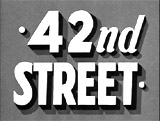


42nd Street (1933), 89 minutes, D: Lloyd Bacon
This quintessential backstage musical was a terrific song and dance Busby Berkeley choreographic extravaganza. Berkeley made screen history with this milestone-grandfather of spectacular musicals, featuring scores of chorus girls, large extravagant musical 'production numbers' and sumptuous art deco sets, surrealistic imagery, optical effects, zoom lenses, escapist musical numbers, fast-paced timing and rhythmic editing, and wise-cracking dialogue. The lively musical drama chronicled the hard work of a manic, ailing Broadway director Julian Marsh (Warner Baxter) behind the making of a musical comedy - where life (whether as a director or chorus girl) depended upon the success of the opening show. The Warner Bros.' 'putting on a show' film (with two Oscar nominations for Best Picture and Best Sound, with no wins) also featured two fresh new juvenile stars, Ruby Keeler (as a chorus girl) and tenor Dick Powell, and it starred Ginger Rogers as veteran showgirl Anytime Annie. Marsh was putting one last effort into a Broadway musical. But at the last minute right before opening night, it appeared doomed when the leading dancer Dorothy Brock (Bebe Daniels) broke her ankle. The show was saved when inexperienced chorus girl and understudy Peggy Sawyer (Ruby Keeler) dream was realized, and she was trained in a marathon rehearsal.

Gold Diggers of 1933 (1933), 96 minutes, D: Mervyn LeRoy
Mervyn LeRoy's blockbuster (a remake of the Gold Diggers of Broadway (1929) which itself was a remake of the silent film Gold Diggers (1923) about chorus girls), was a hugely-successful follow-up to Warners' 42nd Street (1933). It was one of choreographer Busby Berkeley's purest fantasies for the Depression Era, with spectacular numbers. The simple plot was the story of a Broadway show and intrigue surrounding its financial backing. It featured a young, coin-clad Ginger Rogers in the opening production number leading a chorus line of showgirls garbed in more gold-coin costumes singing "We're in the Money" (with one verse in Pig Latin). In another scene, Berkeley undressed his pretty chorus girls entirely behind screens, backlighting them so that the audience could see all they had to offer in silhouette. In another romantic scene "The Shadow Waltz," neon-lighted violins formed geometric designs on the screen with girls dressed all in white. The film ended with the social commentary of the finale's downbeat number: "Remember My Forgotten Man" accompanied by the singing of Joan Blondell - in a tribute to unemployed WWI veterans.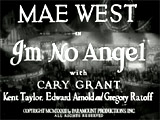

I'm No Angel (1933), 87 minutes, D: Wesley Ruggles
This was one of Mae West's funniest and most-appreciated films (with lots of double entendres) of her career's 12 films, and one of only two films in which West co-starred with Cary Grant. Her third film followed the release of She Done Him Wrong (1933) that reunited her again with Grant. The star of a carnival side show act in Big Bill Barton's Wonder Show, managed by Big Bill Barton (Edward Arnold), was buxom dancer and floozy lady lion tamer Tira (Mae West). In the film's opening, the vamp was introduced by carnival barker Flea Madigan (Russell Hopton) to the leering mostly-male crowd as "the beautiful Tira, dancing, singing marvel of the age, supreme flower of feminine pulchritude....Boys, with the right kind of encouragement, she'll throw discretion to the winds and her hips to the north, east, south and west." She paraded into view with the line: "No wisecracks, now. A penny for your thoughts....Get the idea, boys....Ya follow me?" Later, she advised her friend Thelma (Dorothy Peterson) with her personal motto: "Always remember, honey. A good motto is: 'Take all you can get and give as little as possible.'" The promiscuous Tira also explained how she nabbed rich men - with her philosophy of how to treat men: "Don't forget, honey. Never let one man worry your mind. Find 'em, fool 'em and forget 'em." When not performing, the cold-hearted dame was working in tandem with the carnival's pickpocket Slick Wiley (Ralf Harolde), who pretended to be Tira's husband, to fleece many of her prospective suitors during numerous dalliances, to acquire jewelry, expensive gifts and other favors. She entered into an agreement with manager Bill Barton to be the star attraction for his new NYC show, including the death-defying act of putting her head inside of a lion's mouth. Backstage, she was introduced to "silk hats" (high-society people), including rich playboy Kirk Lawrence (Kent Taylor) who fell hard for her, and caused his snobbish, upper class fiancee Alicia Hatton (Gertrude Michael) to be insanely jealous. When Kirk's playboyish cousin, millionaire leading man Jack Clayton (Cary Grant) was concerned about Kirk's passion for Tira and suggested that Kirk drop Tira before she ruined his life, he also fell in love with Tira. But shortly later after spurning Tira, she sued Jack for breach of promise and hired lawyer Benny Pinkowitz (Gregory Ratoff) to represent her. In the hilarious madcap courtroom scene that ended the film, Tira decided to handle the cross-examination herself, and exhibited great wit and charm. Jack countered by assembling all her ex-lovers to testify against her, but then allowed her to win the case, and ultimately reconciled with her. The film's most quoted lines of West's dialogue were: "Oh Beulah...peel me a grape," "When I'm good, I'm very good. But when I'm bad, I'm better," and "Well, it's not the men in your life that counts, it's the life in your men."

The Invisible Man (1933), 71 minutes, D: James Whale
H.G. Wells' novella tale was beautifully executed by director James Whale as a classic, Universal horror thriller. In the plot, an obsessed mad scientist Jack Griffin (Claude Rains in his film debut) created a chemical formula compound that made him irreversibly invisible (with spectacular special effects), without any counter-agent. At first, the effects were comedic, but the serum slowly turned him into an insane megalomaniac lusting for power, and he wreaked havoc on a British country village.





King Kong (1933), 100 minutes, D: Merian C. Cooper
Director Merian Cooper's and RKO's King Kong was one of the greatest adventure and monster classics of all time. Nature documentary filmmaker Carl Denham (Robert Armstrong) found destitute and beautiful Ann Darrow (Fay Wray) in NYC and hired her to join a chartered ship expedition to the mysterious and remote Skull Island. He discovered a giant ape ("the Beast"), King Kong (a marvel of stop-motion animation), when the natives used a kidnapped Ann ("the Beauty") as bait. The scenes between the blonde, screaming maiden and Kong bristled with fear and sexual overtones. A terrific scene included Kong's island battle with a Tyrannosaurus, before Kong was captured and transported to New York City and put on display. Tormented by crowds, he escaped and created havoc in the city. After breaking free, Kong sought out Ann, and took her to the top of the Empire State Building in the thrilling climax.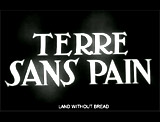

Land Without Bread (1933, Sp.) (aka Las Hurdes, or Terre Sans Pain), 28 minutes, D: Luis Buñuel
Director Luis Bunuel's short, landmark documentary film was a black and white travelogue with mordant narration. It was banned from being shown in Spain by the Spanish government from 1933-1936, due to its troubling subject matter - the impoverished conditions of around 6,000 indigent farming inhabitants in the NW coastal region of Spain (near Portugal) known as Las Hurdes, cut off by a massive mountain range. Poverty, lack of hygiene, pestilence, malnutrition of children and contaminated water sources were rampant, as were the crude and primitive houses.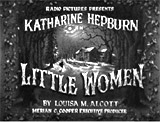

Little Women (1933), 117 minutes, D: George Cukor
Director George Cukor's film has often been regarded as the best and most incomparable of all versions (also in 1949, 1978, and 1994). It was a delightful and faithful screen adaptation of Louisa May Alcott's classic 1868-69 American story of the teenaged March sisters and the sorrows and joys of the New England family. In the plot, Father March had gone off to fight in the Civil War, leaving the family of four very independent sisters who were all coming of age, including coltish tomboy and aspiring writer Jo (Katharine Hepburn). Each of the sisters found independence and strength, and some discovered romance.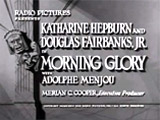

Morning Glory (1933), 74 minutes, D: Lowell Sherman
Director Lowell Sherman's and RKO's showbiz-related, romantic drama was adapted from a Zoe Atkins play, and remade by Sidney Lumet as Stage Struck (1958) with Susan Strasberg. It was in the tradition of other backstage dramas (such as Gregory La Cava's Stage Door (1937)) and tales of unknown actresses rising to stardom (such as William Wellman's A Star is Born (1937)). The future career of Katharine Hepburn, in only her third film, was launched due to her portrayal of a naive and pretentious aspiring actress. Her role paralleled her real-life career experience. Hepburn was awarded with the first (of four) Best Actress Oscars - the film's only nomination. In the story, headstrong, starstruck, yet naive small-town theatre actress from New England (Vermont), Eva Lovelace (Katharine Hepburn) wished to be a stage actress in the big city of New York, to make it big on Broadway. Wearing a shabby coat, she was waiting in the lobby of a major Broadway management casting office (Lewis Easton Productions), where she met her competition - a more experienced actress Miss Gwendolyn Hall (Geneva Mitchell) swathed in a fur wrap, who complained about the number of auditioners. While waiting to speak to Easton, she was befriended by kindly, paternalistic veteran stage actor Robert Harley Hedges (C. Aubrey Smith). She introduced herself and explained her name to him with her non-stop, vivacious chatterbox style, and was even able to forcibly convince him to become her vocal coach and mentor. Then, the yearning, young and inexperienced Eva met with handsome, slimy, middle-aged opportunistic, philandering Broadway theatre owner-manager Lewis Easton (Adolphe Menjou) to unabashedly promote herself. She showed him a remarkable letter from George Bernard Shaw, described her ambitious dreams, and exhibited incredible will and determination to make something of herself. Eva seemed more in love with the romanticized idea of becoming an actress without realizing it would take talent and hard work. Earnest young playwright Joe Sheridan (Douglas Fairbanks, Jr.), the scriptwriter of Easton's new comedic play, became entranced with Eva and her effervescence when he overheard the conversation and took a look at the letter. Eva vowed that she would never allow her talent to go into decline, and would rather dramatically commit a farewell suicide on-stage after doing her best and serving a useful life. Even after Easton departed, Eva continued chatting with his male assistant Mr. Seymour (Fredric Santly) in the outer office, offering to take any mostly-congenial role for $20 dollars a week; she then expressed her life's philosophy as an artist who must be "free to love, free to dream, free to sin, if you call it sin." After initial career disappointments and on the verge of being penniless and hungry, at a celebrity cocktail party held in Easton's penthouse, she became champagne-drunk, completely uninhibited, and almost sat in his lap and boasted and revealed way too much about herself. In front of the guests, she drunkenly performed two Shakespeare oratories - first Hamlet's well-known monologue ("To be or not to be"), and then a show-offy soliloquy excerpt from the Romeo and Juliet balcony scene, taking the part of love-struck Juliet. There was subdued applause when she finished, and Hedges complimented her: "Stylishly beautiful! Impossibly beautiful!" Even Easton added: "Really charming!" She soon became involved in a love triangle between her Broadway manager Louis Easton and Joseph Sheridan. Finally, she got her big break. Fifteen minutes before the curtain debut opening on Broadway for The Golden Bough, Easton's troubled, arrogant and temperamental blonde star-diva Miss Rita Vernon (Mary Duncan) outrageously demanded: "I want my name in electric lights from tomorrow on. I want a run of the play contract to play the part in New York, on the road and in London. I want $1,500 a week and half the profits, and a cut in on the picture rights - Think it over!...I don't need Broadway!" She then asserted that if she didn't get her way, she wouldn't go onstage. Easton decided to let her go and reluctantly replaced her with her understudy ("the little Lovelace girl") - Eva - even without a rehearsal! Easton returned to tell Rita of his decision: "Since you've decided to act in this most unprofessional manner and to take advantage of me at a moment like this, l've decided to let you do exactly as you please." Eva was petrified of failing and claimed she was too tired to act to Sheridan, but then she bolstered her self-confidence and affirmed: "Oh, it was silly the way I just talked. Listen, I'll give a performance tonight that will make you proud of me." It was her triumphant debut performance on Broadway. After the show backstage in her dressing room, Eva was congratulated by her middle-aged wardrobe woman Nellie Navarre (Helen Ware): "Your performance, my dear, was inspirational. I've seen them come, and I've seen them go. This is your moment. May God bless you while it lasts." Easton also congratulated Eva, but insensitively ignored her attempts at affection (she told him: "You're in my heart"). He told her that she didn't belong to any man, but only to Broadway and the theater: ("You must put me out of your heart. I don't belong there, and you don't belong in mine. I'm not the man for you, I never was. You don't belong to any man now. You belong to, to Broadway, to theatre, lights") - causing Eva to feel emotionally devastated. She was also commended, but also lectured and warned by Hedges about instant success going to her head - like a "morning glory" which bloomed beautifully, but then quickly withered and died: ("Every year, in every theater, some young person makes a hit. Sometimes it's a big hit, sometimes a little one. It's a distinct success, but how many of them keep their heads? How many of them work? Youth comes to the fore. Youth has its hour of glory, but too often it's only a morning glory, the flower that fades before the sun is very high"). Hedges added that Nellie was very much like Eva - she was an "overnight" young star years earlier who became "the toast of the town and then faded out." Sheridan also expressed his love for Eva, and she was grateful for his support and understanding ("You've always understood me"), but Easton's earlier rejection of her overshadowed his declaration, and she was unable to accept it. In the film's poignant closing with Nellie, Eva honestly expressed her loneliness, her slight fear and emptiness, and her loss of love. But then with her confidence strengthened about her love for Sheridan: ("I can make him happy, and he can make me happy"), she embraced her tearful assistant, and declared to her that she didn't care if she was a morning glory, speaking defiantly. She delivered a curtain-closing (last lines) statement, vowing that she would not quickly blossom, wither and die like so many other performers: "Nellie, I'm not afraid. I'm not afraid of being just a morning glory. I'm not afraid. I'm not afraid. I'm not afraid. Why should I be afraid? I'm not afraid." Whether her quick success would be long-lasting or withering like a "morning glory" remained to be seen.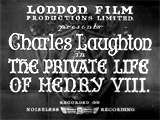




The Private Life of Henry VIII (1933, UK), 97 minutes, D: Alexander Korda
The well-known historical drama (or biopic) chronicled the life of the famous 16th century ruler, the eccentric, spoiled, despotic, corpulent, bawdy and much-married King Henry VIII (Oscar-winning Charles Laughton, the first British actor to win an Academy Award), notoriously known for his gluttony scene and frequent beheading of his many wives. [Note: Laughton repeated his role in MGM's Young Bess (1952) opposite Catherine Parr (Deborah Kerr).] In the film's most unforgettable scene at a banquet table, the gluttonous King Henry VIII devoured a whole chicken and tossed the remains over his shoulder. The film centered mostly on the succession of King Henry's many wives. In the opening scene, Henry's second wife, Anne Boleyn (Merle Oberon) was on-screen briefly awaiting public execution for alleged adultery (by beheading) when she failed to give Henry a male heir. Boleyn was executed on the same day as King Henry's third marriage to Boleyn's dim-witted maid Jane Seymour (Wendy Barrie) (who soon died in childbirth). He then married wily German Duchess Anne of Cleves (Elsa Lanchester, Laughton's real-life wife). After only a short while as she kept winning a game of cards played on their wedding night, she bargained that she would immediately agree to a divorce or annulment if promptly promised two manors, four thousand pounds a year, and Squire Thomas Peynell (John Loder), the messenger sent to bring her to England, would be the master of her household. She divulged that she knew of his intentions to marry Katherine Howard next. Indeed, Henry already had his sights on Lady Katherine Howard (Binnie Barnes), an opportunist courtesan involved in a private affair with Henry's courtier Thomas Culpeper (Robert Donat). Henry realized he had experienced many failed marriages - and now thought that he had found true happiness with Katherine: "So, how many blunders, stupidities and cruelties has a man to pass, before he finds his happiness in a wife?" Henry's advisors hesitantly informed him about his new adulterous wife - she had been unfaithful with Thomas Culpeper: "It is proved, Your Majesty! There are witnesses!" - he was outraged and then distraught. As her execution was being prepared, he said to himself: "Mea culpa." The aging Henry's sixth and last marriage was to a middle-aged widow who was fussy, caring, shrewish and domineering, Lady Catherine Parr (Everley Gregg). Henry delivered the film's final line to the fourth wall: "Six wives, and the best of them's the worst."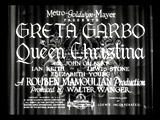



Queen Christina (1933), 97 minutes, D: Rouben Mamoulian
Director Rouben Mamoulian's classic, lavish, well-produced costume-drama story stretched historical truth to some degree. It was a tale about the choice between love or duty. In the film's prologue or opening - 6 year-old Christina (Cora Sue Collins) was crowned as the Protestant Queen of Sweden, after her father, King Gustavus Adolphus (C. Montague Shaw) of Sweden, died in 1632 on the battlefield during the Thirty Years War; Christina had the proper upbringing to be royalty, and had been raised as a boy. She vowed to continue fighting until the war was won. Years later after growing up, the lovely yet controversial 17th century (bisexual?) queen of Sweden, Queen Christina (Greta Garbo in an ethereal performance) now argued for peace after many years of warfare. She dressed in manly clothing and enjoyed fast horse-back riding and hunting with her trusted servant Aage (C. Aubrey Smith). She was no longer interested in a secret affair she had been conducting with her Lord Treasurer Count Magnus (Ian Keith). And she declined to be forced into a politically-correct marriage to military hero cousin Prince Charles (Reginald Owen) to give her country an heir to the throne. She told her Chancellor Oxenstierna (Lewis Stone): "I shall die a bachelor!" Meanwhile, the Queen expressed her romantic attraction to her own neglected and complaining lady-in-waiting Countess Ebba Sparre (Elizabeth Young) whom she affectionately kissed on the lips. Fed up with courtly duties, she restlessly escaped dressed in a young man's clothes, and found herself stranded at a country inn during a snowstorm. She accidentally met and found love with the new Spanish (and Catholic) ambassador to Sweden, Don Antonio de la Prada (John Gilbert, Garbo's silent era leading man and lover). She revealed her true self and had a passionate love affair with him over several days in their shared inn room. She shocked all of Europe by abdicating her throne for love, to follow Don Antonio to Spain. Unfortunately, ambitious and jealous courtier and ex-lover Count Magnus destroyed her dream by demonizing her lover. As she fled to the ship taking Antonio home, she found Don Antonio had been mortally wounded after fighting a duel with Magnus. The final image of the film was the most famous - as she sailed away toward Don Antonio's homeland, she stood pensively at the bow of the ship.



Secrets (1933), 85 minutes, D: Frank Borzage
In director Frank Borzage's melodramatic western remake, silent screen actress Mary Pickford, who was a major star in silents and then in four talking pictures (1929-1933), made her final screen appearance. The film's screenplay (by Frances Marion) was based upon the 1922 Broadway stage play (by Rudolph Besier and May Edington), with stage actress Margaret Lawrence. Interestingly, director Borzage had helmed the earlier silent film Secrets (1924) starring Norma Talmadge. In the story set in New England during the 1860s, the relationship between two young lovers Mary Marlowe (Mary Pickford) and John Carlton (Leslie Howard) was opposed by Mary's parents. Mary's wealthy, shipping magnate and banker father William Marlowe (C. Aubrey Smith) and mother (Blanche Frederici) were pressuring her to marry stuffy English aristocrat Lord Hurley (Herbert Evans). John Carlton, one of her father's clerks, was discharged from his job when their "brazen" love letters were intercepted. At Mary's garden window, John told her of his plan to travel westward to start a new life ("I've got to make a fortune for both of us"), and promised to send for her once he was established. She insisted on immediately joining him ("I can't let you go...take me with you"), and they eloped and ran away together to California after a quick marriage. Their journey westward via trains and wagons was filled with hardships and personal struggles, but finally they settled in a valley, where they built a house, tended a herd of cattle, and had a baby son ("Little John"). One day while John was away with hired hand "Sunshine" (Ned Sparks), notorious cattle rustler and outlaw Jake Houser (Allan Sears), with his brother Davey and his gang stole John's cattle. Seeking revenge, John organized with other ranchers and lynched three of the desperadoes, but Jake was still on the loose and returned to place a siege on the Carlton home. During the gunfight and attack, Mary helped to defend her husband John by shooting and killing Jake. However, she discovered that their ill and feverish young son had died during the gun battle. The tragic scene of Mary's rocking of her dead baby and clinging to it within her arms was the film's emotional highpoint. John's notoriety for pursuing the gang led to his entry into politics and later, he campaigned for governor of California. By this time, the Carltons had four other children. On the night of the election at their mansion, John's scandalous affair with another woman, Senora Lolita Martinez (Mona Maris), became public knowledge. Their relationship ended and despite John's unfaithfulness, Mary (who had known the terrible secret of John's adultery all along) stood by him and he won the governorship. After years of service, he also attained a position in the US Senate for thirty years. In their old age, the rich and elderly Carltons decided to retire and return to California from Washington DC. Mary tried to explain to her four demanding middle-aged children, who disagreed with their decision to leave and couldn't understand their parents, about why they wanted to move away and enjoy their retirement years after 50 years of marriage. The parents refused to sign over guardianship of the estate to their children, and Mary stressed that they wanted to hold onto their many secrets for the remainder of their days: "In every marriage, there are secrets which only one man and one woman know. Your father and I have these secrets and they're ours, and we can't share them with you... secret joys, secret sorrows, lovely and some dreadful secrets. But there, they all belong to us, and your father and I want to be alone with them." They locked their door and then secretly escaped out a back window to drive away in their butler's car, to the tune of "Oh, Susanna!" - repeating their elopement and westward escape of many years earlier (in an overlapping dissolve).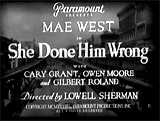

She Done Him Wrong (1933), 66 minutes, D: Lowell Sherman
Mae West's starring role in this lusty Gay 90s spoof featured lots of clever innuendo, witty and irreverent one-liners, and bold carnality. It was buxom Mae West's star-making, most famous film role as a liberated, racy woman who enjoyed her sexuality. The comedy included West's singing of "Frankie and Johnny," "I Wonder Where My Easy Rider's Gone," and "I Like a Man What Takes His Time." In the plot, bejeweled chanteuse and brash entertainer Lady Lou (Mae West) worked in the 1890s Bowery bar-room saloon of her boss and benefactor Gus Jordan (Noah Beery, Sr.), who had given her many diamonds (hence her nickname Diamond Lil). Gus (who was running for Sheriff) secretly trafficked in white slavery (prostitution) and ran a counterfeiting ring (to help finance Lou's expensive diamonds). Gus worked with two other crooked entertainer-assistants or accomplices: Rita (Rafaela Ottiano), a Russian, and Serge Stanieff (Gilbert Roland), Rita's suave boyfriend-lover (who also admired Lou). Next door to the saloon was a city mission (a thinly-disguised Salvation Army), whose young handsome and dashing missionary director, Captain Cummings (Cary Grant) was, in reality (later revealed) an undercover agent working to infiltrate and expose the illegal activities in the bar. Lou's past was uncovered when she heard from her forgotten former boyfriend Chick Clark (Owen Moore). He had been convicted for robbery and went to Sing Sing prison for trying to steal diamonds for her (after being set up by shyster Dan Flynn (David Landau)); Flynn was also trying to expose Jordan's criminality, take over the saloon, romance Lady Lou, and run for the office of Sheriff himself. Meanwhile, Lou was more smitten and attracted to the young handsome, psalm-singing Captain Cummings from the next-door mission, and invited him to visit her in her apartment, with two variations on her famous come-on line: "Why don't you come up sometime 'n see me?" Lou was tipped off by Flynn that Gus' illegal operations (including counterfeiting) had been found out by a slick undercover agent ("dick") nicknamed "The Hawk." At the same time, Chick had escaped from prison and was pressuring Lady Lou to run away with him. A young suicidal runaway named Sally Glynn (Rochelle Hudson) had been sold into 'white slavery' (either as a pickpocket or prostitute) by Rita and Serge. As the film was concluding, Serge attempted to romance Lou with the gift of a diamond pin (it belonged to Rita), but was caught by the jealous Rita. During a struggle, Lou accidentally stabbed Rita to death with the sharp pin. Lou had her bodyguard Spider Kane (Dewey Robinson) dispose of Rita's body, while she would take to the stage to sing. As the film concluded, shots rang out as Chick killed Flynn in the saloon. The gunfire drew a police raid upon the establishment. Cummings revealed himself to Gus as the undercover federal agent "The Hawk" with a badge, arrested Gus and Serge, and sent them to jail to end their criminal operations and activities. Chick was also apprehended by the Hawk and his men during the confrontation. The Hawk also pulled out handcuffs for Lou to also arrest her and take her to jail for her association with criminals; the Hawk took Lou away to 'prison' in an open, horse-drawn carriage rather than in the police wagon. Instead of handcuffing her, though, he had another alternative - he put his own diamond ring on her finger, and then threatened 'jailing her' with a marital proposal that she gladly accepted.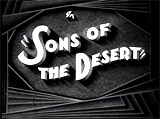

Sons of the Desert (1933), 68 minutes, D: William A. Seiter
This classic, hilarious comedy was the funniest full-length feature from Laurel and Hardy. The two boys Stan Laurel (Himself) and Oliver Hardy (Himself) deviously planned to fool their wives by claiming to have gone on a prescribed ocean voyage to Hawaii (to cure Ollie's feigned illness), while instead attending the national convention of their fraternal Sons of the Desert lodge members in Chicago, with mad-cap conventioneer Charley Chase (Himself). Their plan failed miserably when the ship they were supposed to be on was reported sunk in a typhoon on its return to the mainland from Honolulu, and Mrs. Lottie Hardy (Mae Busch) and Mrs. Betty Laurel (Dorothy Christy) discovered the truth, viewing their husbands in the fraternal parade in Chicago in a movie newsreel. The wayward husbands camped out in the attic, and then had to nervously make up an excuse why they had returned one day ahead of all the other survivors (they jumped ship and "ship-hiked" their way home). In revenge, the two wives plotted to test their exposed mates, to see who would confess first.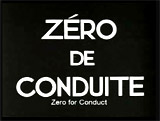


Zéro de Conduite: Jeunes Diables au Collège (1933, Fr.) (aka Zero For Conduct), 41 minutes, D: Jean Vigo
Director Jean Vigo's satirical, semi-autobiographical film with slapstick was banned by French censors until after WWII. The main characters were three rebellious students at a repressive French boarding school with authoritarian, corrupt, inept, and oppressive teachers (known as "monitors" or Surveillants), led by a long-bearded, tyrannical midget principal (Delphin). Only one new teacher was amusing - Huguet (Jean Dasté) - mimicking Charlie Chaplin and walking on his hands on his desk during class. "Zero for Conduct" grades and detention were often awarded to three students in particular: Bruel (Constantin Goldstein-Kehler), Caussat (Louis Lefebvre), and Colin (Gilbert Pruchon), joined by a fourth who proved himself - Tabard (Gerard de Bedarieux). They plotted to destroy the school during its annual Commemoration/Alumni Day celebrations, with a messy, slow-motion feather pillow fight in the dorm, a mock regal Catholic procession, and a liberating finale when the boys pelted teachers with debris from the rooftop (an inspiration for Lindsay Anderson's If... (1968)).